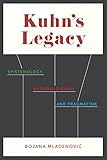Kuhn's Legacy : Epistemology, Metaphilosophy, and Pragmatism / Bojana Mladenović.
Material type: TextPublisher: New York, NY : Columbia University Press, [2018]Copyright date: ©2017Description: 1 online resourceContent type:
TextPublisher: New York, NY : Columbia University Press, [2018]Copyright date: ©2017Description: 1 online resourceContent type: - 9780231146685
- 9780231520744
- 501 23//sweeng
- Q175 .M6885 2017
- online - DeGruyter
- Issued also in print.
| Item type | Current library | Call number | URL | Status | Notes | Barcode | |
|---|---|---|---|---|---|---|---|
 eBook
eBook
|
Biblioteca "Angelicum" Pont. Univ. S.Tommaso d'Aquino Nuvola online | online - DeGruyter (Browse shelf(Opens below)) | Online access | Not for loan (Accesso limitato) | Accesso per gli utenti autorizzati / Access for authorized users | (dgr)9780231520744 |
Browsing Biblioteca "Angelicum" Pont. Univ. S.Tommaso d'Aquino shelves, Shelving location: Nuvola online Close shelf browser (Hides shelf browser)

|

|

|

|

|

|

|
||
| online - DeGruyter The Columbia Sourcebook of Mormons in the United States / | online - DeGruyter Fiction Across Borders : Imagining the Lives of Others in Late-Twentieth-Century Novels / | online - DeGruyter Dialectical Passions : Negation in Postwar Art Theory / | online - DeGruyter Kuhn's Legacy : Epistemology, Metaphilosophy, and Pragmatism / | online - DeGruyter American Literature's Aesthetic Dimensions / | online - DeGruyter The Rey Chow Reader / | online - DeGruyter Food and Faith in Christian Culture / |
Frontmatter -- Contents -- Acknowledgments -- INTRODUCTION -- 1. AN OVERVIEW OF KUHN'S PHILOSOPHY OF SCIENCE -- PART I: HISTORY -- 2. THE ROLE OF THE HISTORY OF SCIENCE IN KUHN'S EARLY PHILOSOPHY -- 3. "MUCKRAKING" IN HISTORY -- PART II: RATIONALITY -- 4. KUHN'S ANTIRELATIVISM -- 5. COLLECTIVE RATIONALITY OF SCIENCE -- 6. LOOKING BACK: PROGRESS IN SCIENCE -- PART III: PRAGMATISM -- 7. KUHN'S PRAGMATIST ROOTS -- Notes -- Bibliography -- Index
restricted access online access with authorization star
http://purl.org/coar/access_right/c_16ec
Thomas Kuhn's The Structure of Scientific Revolutions is one of the most important books of the twentieth century. Its influence reaches far beyond the philosophy of science, and its key terms, such as "paradigm shift," "normal science," and "incommensurability," are now used in both academic and public discourse without any reference to Kuhn. However, Kuhn's philosophy is still often misunderstood and underappreciated. In Kuhn's Legacy, Bojana Mladenović offers a novel analysis of Kuhn's central philosophical project, focusing on his writings after Structure.Mladenović argues that Kuhn's historicism was always coupled with a firm and consistent antirelativism but that it was only in his mature writings that Kuhn began to systematically develop an original account of scientific rationality. She reconstructs this account, arguing that Kuhn sees the rationality of science as a form of collective rationality. At the purely formal level, Kuhn's conception of scientific rationality prohibits obviously irrational beliefs and choices and requires reason-responsiveness as well as the uninterrupted pursuit of inquiry. At the substantive, historicized level, it rests on a distinctly pragmatist mode of justification compatible with a notion of contingent but robust scientific progress. Mladenović argues that Kuhn's epistemology and his metaphilosophy both represent a creative and fruitful continuation of the tradition of American pragmatism. Kuhn's Legacy demonstrates the vitality of Kuhn's philosophical project and its importance for the study of the philosophy and history of science today.
Issued also in print.
Mode of access: Internet via World Wide Web.
In English.
Description based on online resource; title from PDF title page (publisher's Web site, viewed 02. Mrz 2022)


